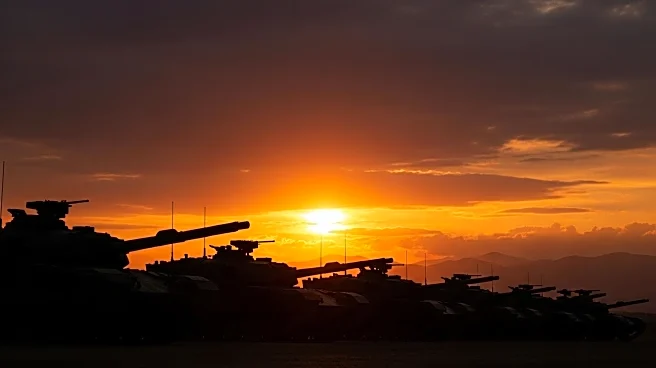What is the story about?
What's Happening?
North Korean leader Kim Jong Un is set to visit China for a military parade, marking his first appearance at a multilateral event with other heads of state. The parade, scheduled for September 3 at Beijing's Tiananmen Square, commemorates the 80th anniversary of the end of World War II. Kim's presence alongside Chinese President Xi Jinping and Russian President Vladimir Putin is seen as a rare show of unity and defiance against U.S.-led pressure. The visit highlights a mutual commitment to strengthening China-North Korea relations, as confirmed by China's foreign ministry and North Korea's official news agency.
Why It's Important?
Kim Jong Un's participation in the parade signifies a potential strategic realignment between North Korea and China. This development could impact U.S. foreign policy, as it suggests a strengthening of ties between Pyongyang and Beijing amidst international pressures. The event may challenge U.S. influence in the region and complicate diplomatic efforts, particularly concerning North Korea's nuclear program and regional security dynamics. The gathering of leaders from various countries underscores the shifting alliances and the complex geopolitical landscape in Northeast Asia.
What's Next?
Kim Jong Un's visit to China may lead to further diplomatic engagements between North Korea and China. Observers will be watching for any announcements or agreements that may emerge from Kim's meetings with Chinese leaders. Additionally, the U.S. and its allies may need to reassess their strategies in dealing with North Korea, considering the potential strengthening of ties between Pyongyang and Beijing. The event may also prompt discussions on regional security and economic cooperation among the involved nations.
Beyond the Headlines
Kim's attendance at the parade could be seen as a symbolic gesture of defiance against Western influence, particularly the U.S. The gathering of leaders from countries like Iran, Belarus, and Serbia suggests a possible formation of a new geopolitical bloc that challenges existing power structures. This development may have long-term implications for international relations, as it could lead to increased cooperation among these nations in various sectors, including military and economic partnerships.
















